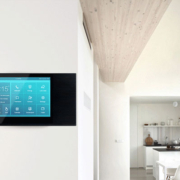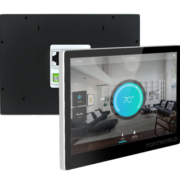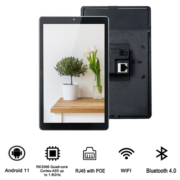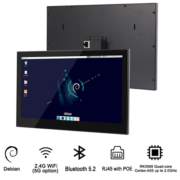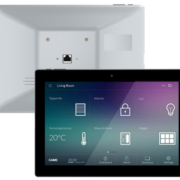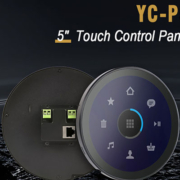Pros and Cons of Installing a Smart Home (Home Automation)
Home automation or smart home technology is the change in interaction between humans and their living spaces. The modern home is efficient and connected with systems ranging from intelligent lighting to centralized control panels. Benefits of a smart home are great, however, challenges before undertaking a smart home installation should also be considered. This article discusses the advantages and disadvantages of installing a smart home while highlighting how Portworld’s smart home control panel solutions will enhance your experience and take away the drawbacks.
Pros of Installing a Smart Home
1. Convenience and Centralized Control
One of the most attractive features of a smart home is the ability to control all connected devices from a single interface — whether via a smartphone app, voice command, or a smart home control panel.
Portworld offers 4-inch and 5-inch touch screen smart control panels, which allow users to manage lighting, climate, security systems, and entertainment with ease. These panels support customizable interfaces, enabling homeowners to design their own control logic and group functions by room or scenario.
2. Energy Efficiency and Cost Savings
Smart thermostats, lighting, and power management systems can significantly reduce energy consumption. By automating heating, cooling, and lighting based on usage patterns or occupancy, homeowners can lower their utility bills.
Portworld’s energy-efficient control panels also support real-time energy monitoring, helping users gain insights into their consumption and adjust settings to reduce waste.
3. Enhanced Security
Smart homes improve safety with real-time surveillance, motion sensors, remote door locks, and security alerts. All these can be monitored and controlled via a smart home security control panel.
Portworld‘s smart panels integrate with leading home security systems and support PoE (Power over Ethernet), ensuring stable power and data transmission without the need for multiple cables or adapters — a clean and secure solution.
4. Customization and Scalability
With a growing variety of smart devices on the market, a smart home can be customized to match individual lifestyles.
Portworld helps OEMs and integrators with customizable control panels, CKD/SKD support, and engineering services for local assembly. Whether for a minimalist apartment or a multi-room smart villa, Portworld’s modular architecture allows seamless scalability.
5. Voice Assistant and App Integration
Smart home systems that work with Alexa, Google Assistant, or proprietary apps make it easy to control devices hands-free or on the go.
Portworld’s Android-based control panels support third-party app integration and voice assistant compatibility, making them ideal for homeowners looking to connect smart lighting, HVAC, and media systems into one unified experience.
Cons of Installing a Smart Home
1. Initial Cost of Setup
High-quality smart devices and control panels can be expensive, especially when outfitting an entire home. Installation, system configuration, and device compatibility may also increase upfront costs.
However, Portworld helps lower total system costs through SKD/CKD solutions, allowing for local assembly and reduced import tariffs. Their engineering team also assists in optimizing PCBA designs to save on hardware production costs.
2. Complexity and Learning Curve
Smart homes, particularly with many integrated devices, can be overwhelming to set up and manage. Some users may find the technology difficult to use or troubleshoot.
To solve this, Portworld provides tailored support and system documentation, making installation and usage easier for both integrators and end-users. Their control panels feature intuitive UI and simplified controls that enhance the user experience.
3. Security and Privacy Concerns
Connected devices pose potential cybersecurity risks. Hackers could exploit vulnerabilities in the network or access personal data if proper protections aren’t in place.
Portworld places a strong emphasis on firmware security and network isolation, ensuring that their smart control systems maintain data integrity and device protection.
4. Device Compatibility Issues
Different brands and ecosystems may not always work well together, leading to frustration and limited functionality.
Portworld’s systems are designed to support open protocols and APIs, ensuring compatibility with a wide range of third-party platforms and smart home devices. Their Android-based platform is particularly flexible for developers and integrators.
Why Choose Portworld for Your Smart Home Needs?
Portworld stands out in the smart home control panel industry by offering:
- High-quality 4-inch and 5-inch smart control panels with touch screens
- PoE-enabled options for clean, reliable installations
- Custom UI and OS support based on Android
- Engineering services to optimize PCBA design
- CKD/SKD product delivery to reduce costs and simplify logistics
- Seamless integration with third-party platforms, security systems, lighting, HVAC, and more
Portworld is not only a supplier of smart control hardware but also a strategic partner for businesses looking to enter or scale in the smart home market.

